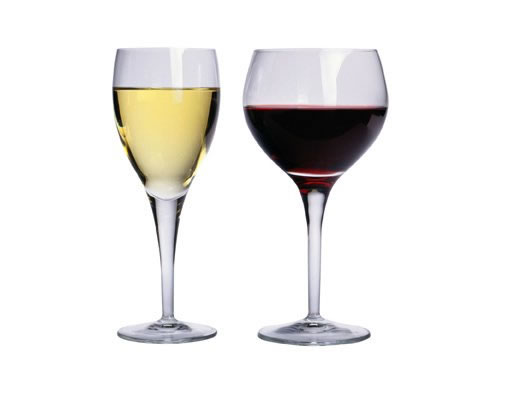Wine is part of the Mediterranean Diet and this is a fact. If you take a look at the Mediterranean diet pyramid and related articles, it is mentioned that red wine can be taken in moderation daily. In the Mediterranean culinary cuisine, wine accompanies any meal and many Mediterranean recipes have wine, red of white, as one of the ingredients of the Mediterranean food to be prepared.
Wine is part of the Mediterranean tradition; it is part of the Mediterranean lifestyle.
Wine comes from the juice of the grapes and just as any other fruit juice it contains a variety of phytonutrients. There are three ‘’variations’’ or types of wine: red, rose and white with red and white being the most common.
Red or white wine?

Usually when we refer to wine, the picture of the wine that comes to our mind is that of the red wine. For serious wine drinkers, wine means red wine. This is true in the Mediterranean diet as well. When the Med diet pyramid refers to a glass of wine, we actually mean red wine. Both red and white wines have phytonutrients but white lacks some of the vital phytonutrients due to the wine process that is used to make it. Red wine is made using the whole grape thus all phytonutrients that the grape has are in the red wine. Red wine is rich in polyphenols, a variety of phytonutrients, which are divided in two main categories, the flavonoids and the non-flavonoids with each category having its significance in our health.
How does wine help?
Red wine helps in our health due to the flavonoids and non-flavonoids that it contains. Flavonoids are further divided into 6 specific subgroups with resveratrol being the most powerful of the 6 subgroups. Resveratrol is found in the skin and seeds of the grape and because red wine is produced using the whole grape and the fermentation takes place with them, skin and seeds, it has high content of resveratrol, 20 times more than in vegetables. There are various grape varieties that can produce more resveratrol than others due to the climatic conditions in which they grow. Resveratrol is an antioxidant. Non-flavonoids like ellagic acid and tannins act also as antioxidants. Antioxidants are the ones that help us keep our health.
Wine fights diseases
It is often said that wine fights diseases but this is not said for other alcoholic beverages. This is correct because it is not alcohol that fights the diseases but the antioxidants that are found in high concentration in red wine. Having identified that wine contains flavonoids and non-flavonoids which in their turn contain antioxidants it is important to understand that are the antioxidants that have these healthy effects. Antioxidants are a variety of other substances like vitamins, phytonutrients and minerals that prevent oxidation and specifically prevent the oxidation of cells and tissues. This has as an effect to prevent the destruction of the cells. This in its turn prevents the blood from becoming sticky and thick which, as part of the chain effect, does not allow blood to clot thus reducing the risk of heart attack and stroke. Antioxidants also boost the HDL cholesterol, known as ‘’good’’ cholesterol and reduces the LDL cholesterol, known as ‘’bad’’ cholesterol.
Wine, and more specifically red wine, prevents heart attacks due to the effect of the increased concentration of antioxidants it contains. In addition the antioxidants keep the immune system healthy, which in its turn acts an anti-aging factor and fights infections and diseases.
One can argue that wine is not an exclusivity of the Mediterranean diet and that any kind of diet can include wine in this cuisine and diet plan. This is correct but wine in the Mediterranean diet acts as an additive component, adding its benefits to the benefits given by the other basic components of the Mediterranean diet, like the white cheese, the vegetables, fish, legumes and fruits. Also wine and its beneficial contents, the antioxidants neutralize some of the negative aspects of other food combinations thus maintaining the overall healthy rated Mediterranean diet.
Moderation is the key
As with every basic component in life and the Mediterranean diet, wine should be consumed in moderation since apart from the antioxidants, wine is a source of calories. Five ounces of red dry wine contain about 100 calories which is equivalent to 1.5 ounces of whiskey.
In conclusion, wine, and more specifically red wine, has a role for our health and this is why it is included in the Mediterranean diet but it should be consumed in moderation.














{ 0 comments… add one now }